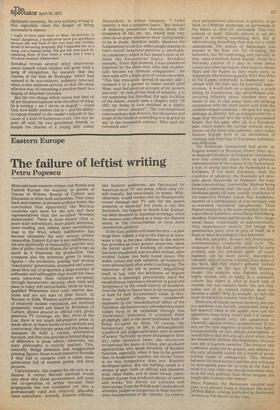Talking of books
Ugly duckling
Benny. Green
In those bleak but depressingly frequent moments when the gulf between his aspirations and his achievement seems too vast to contemplate, and the expression on his own silly face too vacuous to live with, the literary adVenturer could do a lot worse than to turn to the apparently inconsequential but really very purposeful life of Henri Beyle. While masquerading as a cynical wit called Stendhal, Beyle wrote a few masterpieces in a tearing hurry, drifted on the turbulent tide of French politics in the days of its Napoleonic convulsions, pursued a great many women to precious little effect, and was so reconciled to the uncommercial nature of his own literary approach that his chronicles are dotted with whimsical asides to the effect that the words he is writing will of course not be read by anyone for goodness knows how many years:
i must beg the reader — perhaps he was born this morning in the house next door— That typical joke appears in a casual but wholly enchanting work* written in fifteen days, in which Beyle, serving as French consul in a papal backwater called Civita-Vecchia, gives an account of his life in Paris in the 1820s, an account without affectation and apparently without literary artifice too. I say apparently because although Stendhal insists that these notes are private, and "not to be published until at least ten years after my death out of consideration for the people I have mentioned," if ever there was a writer whose art concealed art it was Stendhal. Indeed it was the casual modernity of his tone, astonishingly intimate and offhand when seen in its nineteenth century context, which forced him to the conclusions about his own unsaleability. What Stendhal seems to have picked up in his oddly fragmented career as soldier and boulevardier is a psychological insight which nobody was supposed to have stumbled on for at least another two generations. Every stranger is an exercise not only in physical, exterior observation, but also of psychological analysis and pigeon-holing. He meets a man, examines and analyses his social and emotional structures, concludes that he now "understands" that particular type, and moves on with a kind of amoral compassion to the next specimen. Where Stendhal is unpredictable and amusing is in his perception that our assumptions about one characteristic implying another are usually false, and that very often the precise opposite is more likely to be true. While in Paris he takes up with two or three companions whose sociability excuses everything, a certain army officer, for example, "who had had so many women that he had become sincere as far as they were concerned", and M. Barot, "a delightfully agreeable young man without any liveliness of mind whatsoever". Later he meets a "decent man who nevertheless was very meticulous in all his petty household affairs", The effect of all this is to dupe the reader into the illusion that he is eavesdropping on the murmurous intimacies of a highly sophisticated, highly amusing and very wise spectator.
Like all ugly men, Stendhal had deep faith in the aphrodisiac powers of money and success, and like a great many would be seducers in society, knew perfectly well that there are times when to court an unattractive lady is a *Memoirs of an Egotist Stendhal Translated by David Ellis (Chatto and Winclus £2.50) diplomatic necessity. He sees nothing wrong in this, especially when the danger of being successful is remote: I ought to have paid court to Mme. Montcertin.. It wasn't dangerous. I would never have got anywhere because she was fond of her two men and terribly afraid of becoming pregnant. But I regarded her as a thing, not a human being. She got her own back by repeating three of four times a week that I was a frivolous creature, almost mad.
Stendhal reveals several other discoveries about himself which readers will greet with a pang of recognition, for instance that the charms of the Bois de Boulogne, which had seemed to be non-existent, suddenly returned when a new mistress arrived, or that the most effective way of concealing a stricken heart is a display of detached cynicism. But the two things which reveal him best of all are his preoccupation with the effect of what he is writing — am I clever or stupid? — Good God, how badly written this is — and his ability to expose himself to the reader's ridicule in the cause of a kind of humorous truth. One day he goes off with his two gentlemen friends to sample the charms of a young lady called
Alexandrine, in whose company "I failed entirely; it was a complete fiasco." But instead of deducing pretentious theories about the transience of life, etc, etc, which men very often do on paper whenever their virility seems to be in doubt, Stendhal mildly observes the fundamental truth that other people assume in one's sexual behaviour-patterns a mechanistic consistency which in fact doesn't exist at all. After the Alexandrine fiasco, Stendhal remarks, "From that moment, I was considered impotent by the three men who had accidentally become my intimate companions". He then adds with a slight grin of virtue rewarded, "This fine reputation spread in society and I retained it to a greater or lesser extent until Mme. Azur had given an account of my powers and acts". In view of that kind of urbanity, it is not surprising that Stendhal, the ugly duckling of the salons, should open a chapter with ,"In 1821 my being in love resulted in a highly comical virtue: chastity". The conversational tone is perhaps halo Svevo's, but the power and scope of the intellect controlling it is as great as any in the nineteenth century. Who said the twentieth also?



































 Previous page
Previous page